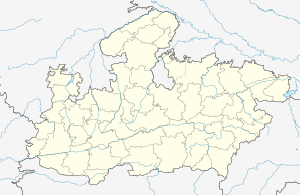Pichhore, Gwalior
Pichhore is a town and a nagar panchayat in Gwalior district in the Indian state of Madhya Pradesh.
Pichhore | |
|---|---|
city | |
 Pichhore Location in Madhya Pradesh, India  Pichhore Pichhore (India) | |
| Coordinates: 25°57′26″N 78°23′41″E | |
| Country | |
| State | Madhya Pradesh |
| District | Gwalior |
| Population (2001) | |
| • Total | 11,725 |
| Languages | |
| • Official | Hindi |
| Time zone | UTC+5:30 (IST) |
| ISO 3166 code | IN-MP |
| Vehicle registration | MP |
Demographics
As of 2001 India census,[1] Pichhore had a population of 11,725. Males constitute 53% of the population and females 47%. Pichhore has an average literacy rate of 52%, lower than the national average of 59.5%: male literacy is 63%, and female literacy is 40%. In Pichhore, 17% of the population is under 6 years of age.
History
It was a Jat principality[2] before the rise of Scindias.Its rulers belong to deoderiya clan.Raja Pahar Singh helped Maharaja Jawahir Singh To expel Maratha from the Gird.
Like their Bambrolia Kinsmen in Gohad the Doderiyan Jats of Pichhore were also reluctant emigrants from the Punjab. About the year 1340 A.D. Raja Bhagirath founded a settlement around the village of Keo some 35 miles South East of Gwalior, which subsequently became famous as Pichhor. Raja Bhargirath had four sons. namely Chandermani, Sinhmani, Akshamani and Mado Singh.
Chandermani the eldest succeeded his father. On Chandermani's death, his only on Dhruve Angad became the ruler of Pichor. He started the building of Pichor fort in 1448 which was completed by his son Raja Hamir Deo[3] the First, whose reign partly coincided and probably overlapped the reign of the famous Tomar chief Raja Man Singh. Hamir Deo the First saw hard days in his conflicts with the chiefs of Narwar and Orcha. But by the very able stratagem of his wife Ganga Kumari he was able to over come his problems and continued to rule Pichor for many years and was probably still alive when Babar appeared on the Indian scene. After that there is a hiatus in the Doderiyan tradition.
During the rule of Hamir Deo the second, a contemporary of Shah Jahan I (1628-58 A.D.), the Pichor principality grew into a modest size[4]. His just rule and martial exploits are to this day extolled by the itinerant bards of Northern Bundhel Khand. Hamir's sense of Justice is reputed to have led him to sentence his own beloved son to death for an unintentional misdemeanor in a hunting field.
Hamir Deo was succeeded by Raja Padam Singh, who ruled Pichor during The greater part of Aurangzeb's reign. Padam Singh had two sons. Hindupati and Prithvipati. Hindupati was a reputed scholar and poet. He wrote a religions tract called Tattva-Bodha which is still extant. Hindupati was succeeded by his son Pahar Singh. During 1767, Pahar Singh had joined forces with Jawahar Singh for expelling the Maratha troops from the Bhind area and in the latter's expedition to Ajmer and Pushkar. However, about the year 1783-84 Pahar Singh had accepted a feudatory status under Mahadji Sindhia. Chhattar Singh successor of Pahar Singh was treacherously deprived of Pichor by Daulat Rao Sindhia. His wife's blood stained palm impression in the citadel at Pichor still commemorates her exile from that ancient fortress.
References
- "Census of India 2001: Data from the 2001 Census, including cities, villages and towns (Provisional)". Census Commission of India. Archived from the original on 16 June 2004. Retrieved 1 November 2008.
- History of the Jats by Kalki Ranjan Qunongo.
- http://www.visitindia.org.in/madhya%20pradesh/gwalior.html. Missing or empty
|title=(help) - Dainik Bhaskar,Gwalior. Cite journal requires
|journal=(help); Missing or empty|title=(help)